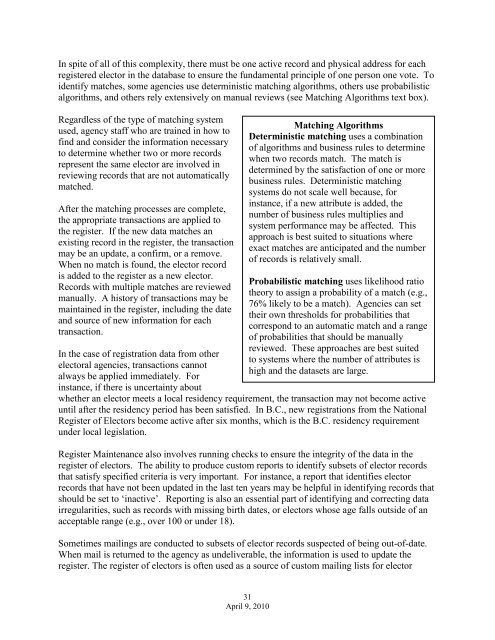Electoral-Management-Reference-Model-v.1.0
Electoral-Management-Reference-Model-v.1.0
Electoral-Management-Reference-Model-v.1.0
You also want an ePaper? Increase the reach of your titles
YUMPU automatically turns print PDFs into web optimized ePapers that Google loves.
In spite of all of this complexity, there must be one active record and physical address for each<br />
registered elector in the database to ensure the fundamental principle of one person one vote. To<br />
identify matches, some agencies use deterministic matching algorithms, others use probabilistic<br />
algorithms, and others rely extensively on manual reviews (see Matching Algorithms text box).<br />
Regardless of the type of matching system<br />
used, agency staff who are trained in how to<br />
find and consider the information necessary<br />
to determine whether two or more records<br />
represent the same elector are involved in<br />
reviewing records that are not automatically<br />
matched.<br />
After the matching processes are complete,<br />
the appropriate transactions are applied to<br />
the register. If the new data matches an<br />
existing record in the register, the transaction<br />
may be an update, a confirm, or a remove.<br />
When no match is found, the elector record<br />
is added to the register as a new elector.<br />
Records with multiple matches are reviewed<br />
manually. A history of transactions may be<br />
maintained in the register, including the date<br />
and source of new information for each<br />
transaction.<br />
In the case of registration data from other<br />
electoral agencies, transactions cannot<br />
always be applied immediately. For<br />
instance, if there is uncertainty about<br />
Matching Algorithms<br />
Deterministic matching uses a combination<br />
of algorithms and business rules to determine<br />
when two records match. The match is<br />
determined by the satisfaction of one or more<br />
business rules. Deterministic matching<br />
systems do not scale well because, for<br />
instance, if a new attribute is added, the<br />
number of business rules multiplies and<br />
system performance may be affected. This<br />
approach is best suited to situations where<br />
exact matches are anticipated and the number<br />
of records is relatively small.<br />
Probabilistic matching uses likelihood ratio<br />
theory to assign a probability of a match (e.g.,<br />
76% likely to be a match). Agencies can set<br />
their own thresholds for probabilities that<br />
correspond to an automatic match and a range<br />
of probabilities that should be manually<br />
reviewed. These approaches are best suited<br />
to systems where the number of attributes is<br />
high and the datasets are large.<br />
whether an elector meets a local residency requirement, the transaction may not become active<br />
until after the residency period has been satisfied. In B.C., new registrations from the National<br />
Register of Electors become active after six months, which is the B.C. residency requirement<br />
under local legislation.<br />
Register Maintenance also involves running checks to ensure the integrity of the data in the<br />
register of electors. The ability to produce custom reports to identify subsets of elector records<br />
that satisfy specified criteria is very important. For instance, a report that identifies elector<br />
records that have not been updated in the last ten years may be helpful in identifying records that<br />
should be set to ‘inactive’. Reporting is also an essential part of identifying and correcting data<br />
irregularities, such as records with missing birth dates, or electors whose age falls outside of an<br />
acceptable range (e.g., over 100 or under 18).<br />
Sometimes mailings are conducted to subsets of elector records suspected of being out-of-date.<br />
When mail is returned to the agency as undeliverable, the information is used to update the<br />
register. The register of electors is often used as a source of custom mailing lists for elector<br />
31<br />
April 9, 2010


